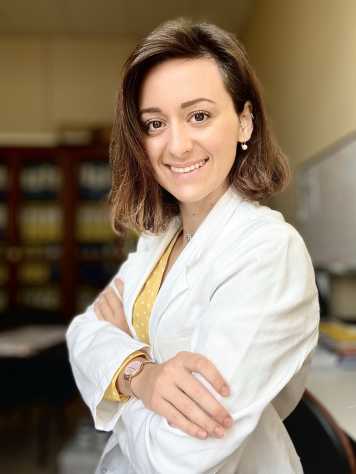Carestiato, Silvia

Silvia Carestiato
Visiting PhD student, Università di Torino, Nov. 2023 to Nov. 2024
Background
I obtained a master’s degree in Molecular Biology from the University of Genoa in 2019. Since scientific disciplines, such as Neuroscience and Medical Genetics, have always interested me, from 2019 to 2021, during my postgraduate research fellowships at the Universities of Genoa and Turin, I focused on studying pathogenic mechanisms related to neurodevelopmental disorders (NDDs) and collaborated in identifying new disease-associated genes through whole exome sequencing and conducted functional analyses using novel approaches.
In November 2021 I began my doctoral studies in Medical Genetics at the Laboratory of Medical Genetics and Rare Diseases (University of Turin).
My PhD project focuses on studying a novel NDD related to the TANGO2 (Transport And Golgi Organization 2 Homolog) gene. Biallelic loss-of-function variants in the TANGO2 gene are linked to an autosomal recessive disorder characterized by cardiac arrhythmia, metabolic crises, rhabdomyolysis, and kidney damage. Patients with this TANGO2-related disorder also exhibit varying degrees of neuronal impairment, including progressive neurodegeneration, developmental delay, seizures, absent speech, and cerebral atrophy.
Starting from two phenotypically discordant TANGO2-patients, we generated human induced Pluripotent Stem Cells (hiPSCs) to investigate morphological properties caused by TANGO2-loss in neural stem cells and cortical neurons. Overall, our preliminary results suggest a crucial role of TANGO2 in early-stage neurodevelopment, particularly in neural tube formation, cellular migration, as well as in neuron maturation.
In December 2023, I joined the Laboratory of Biosensors and Bioelectronics (LBB) at ETH to pursue functional analyses on neurons. I will use iNeurons derived from TANGO2-patients to compare electrical activity recordings on HD-CMOS MEAs, equipped with PDMS microstructures to guide axons and create well-defined biological neuronal connections.
For electrophysiological recording, cells will be exposed to physiological and hypoxic conditions to reproduce a metabolic derangement and assess whether neurological impairment is a consequence of the metabolic crises that usually occur in patients under fasting. In this perspective, electrophysiological recording using MEA devices will clarify the molecular function of TANGO2 in neuronal synaptic connectivity.
Research Interest
- Neurodevelopmental disorders
- hiPSCs-derived neuronal models
- Neuronal Network Dynamics
Publications
- Brusco, C. Giovenino, S. Trajkova, L. Pavinato, S. Cardaropoli, V. Pullano, E. Sukarova- Angelovska, S. Carestiato, P. Salmin, A. Rinninella, A. Battaglia, L. Bertoli, A. Fadda, F. Palermo, D. Carli, A. Mussa, P. Dimartino, A. Bruselles, T. Froukh, G. Mandrile, B. Pasini, S. De Rubeis, J. Buxbaum, T. Pippucci, M. Tartaglia, M. Rossato, M. Delledonne, G. B. Ferrero. “Skewed X-chromosome inactivation in unsolved neurodevelopmental disease cases can guide reevaluation for X-linked genes” (EJHG 2023; 10.1038/s41431-023-01324-w )
- L. Pavinato, A. Delle Vedove, D. Carli, M. Ferrero, S. Carestiato, J. L. Howe, E. Agolini, D. A. Coviello, I. Van Der Laar, P. Au, E. Di Gregorio, A. Fabbiani, S. Croci, M. Mencarelli, L. Bruno, A. Renieri, D. Veltra, C. Sofokleous, L. Faivre, B. Mazel, H. Safraou, A. Denommè-Pichon, R. van Jaarsveld, A. Childers, C. Rogers, A. Novelli, S. De Rubeis, J. Buxbaum, S. Sherer, G. B. Ferrero, B. Wirth, A. Brusco. “CAPRIN1 haploinsufficiency causes a neurodevelopmental disorder with language impairment, ADHD and ASD” (Brain 2022; 10.1093/brain/awac278)
- S. Candiani*, S. Carestiato*, A. Meck, D. Bani, M. Bozzo, V. Obino, M. Ori, F. Rosamilia, M. De Sarlo, M. Pestarino, I. Ceccherini, T. Bachetti. “Alexander disease modelling in zebrafish: an in vivo system to perform drug screening” (Genes 2020; 10.3390/genes11121490)